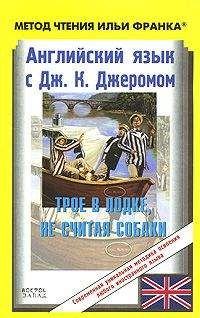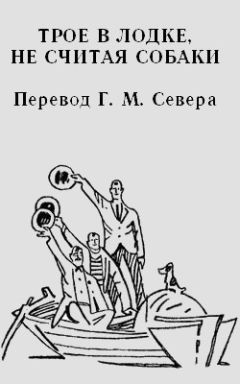Jerome Jerome - Английский язык с Джеромом К. Джеромом. Трое в лодке, не считая собаки
I plodded conscientiously through the twenty-six letters (я добросовестно проработал двадцать шесть букв /алфавита/; to plod — с трудом брести, тащиться; продвигаться с трудом /в работе и т.д./; упорно работать, корпеть над чем-либо), and the only malady I could conclude I had not got was housemaid's knee (и единственной болезнью, /которой, как/ я мог заключить, я не болел, было воспаление сумки надколенника; to conclude — делать вывод, приходить к заключению; to get; housemaid — горничная, уборщица /особенно в частном доме/; maid — служанка, горничная; дева, девушка; knee — колено).
typhoid [ˈtaɪfɔɪd] wondered [ˈwʌndǝd] ague [ˈeɪɡju:] cholera [ˈkɔlǝrǝ] diphtheria [dɪfˈƟɪǝrɪǝ] conscientiously [kɔnʃɪˈenʃǝslɪ] knee [ni:]
I sat for a while, frozen with horror; and then, in the listlessness of despair, I again turned over the pages. I came to typhoid fever — read the symptoms — discovered that I had typhoid fever, must have had it for months without knowing it — wondered what else I had got; turned up St. Vitus's Dance — found, as I expected, that I had that too, — began to get interested in my case, and determined to sift it to the bottom, and so started alphabetically — read up ague, and learnt that I was sickening for it, and that the acute stage would commence in about another fortnight. Bright's disease, I was relieved to find, I had only in a modified form, and, so far as that was concerned, I might live for years. Cholera I had, with severe complications; and diphtheria I seemed to have been born with.
I plodded conscientiously through the twenty-six letters, and the only malady I could conclude I had not got was housemaid's knee.
I felt rather hurt about this at first (я почувствовал /себя/ немного оскорбленным из-за этого поначалу; to feel hurt — чувствовать себя оскорбленным, уязвленным; принимать на свой счет; to hurt — причинять боль, наносить обиду); it seemed somehow to be a sort of slight (это казалось своего рода неуважением; somehow — так или иначе, каким-либо образом; slight — проявление пренебрежительного равнодушия; неуважение). Why hadn't I got housemaid's knee (почему я не заболел воспалением сумки надколенника)? Why this invidious reservation (почему такая возмутительная несправедливость; reservation — оговорка, замечание)? After a while, however, less grasping feelings prevailed (немного погодя, впрочем, менее жадные чувства восторжествовали; grasping — цепкий, хваткий; жадный, скупой; to prevail — /вос/торжествовать, одержать победу; преобладать). I reflected that I had every other known malady in the pharmacology (я подумал, что у меня есть все остальные болезни, известные в фармакологии = в медицине; to reflect — отражать; раздумывать, размышлять; to know-knew-known), and I grew less selfish, and determined to do without housemaid's knee (я стал менее эгоистичным и решил обойтись без воспаления сумки надколенника; to grow — расти, увеличиваться; делаться, становиться). Gout, in its most malignant stage (подагра в своей самой злокачественной форме; stage — помост, сцена; стадия, фаза), it would appear, had seized me without my being aware of it (казалось, поразила меня без моего ведома; to seize — хватать, захватывать; охватывать; to be aware of — отдавать себе отчет в, быть осведомленным); and zymosis I had evidently been suffering with from boyhood (а зимосисом я, видимо, страдал с отрочества; zymosis — брожение; заразная болезнь). There were no more diseases after zymosis (/в книге/ больше не было заболеваний после зимосиса), so I concluded there was nothing else the matter with me (так что я решил, /что/ больше нет неприятностей со мной = в остальном я в порядке; else — еще, кроме; другой; matter — вещество, сущность, вопрос; the matter — неприятность, трудность; what is the matter with this? — чем это не подходит, что с этим не так?).
I sat and pondered (я сидел и размышлял; to sit; to ponder — обдумывать, взвешивать, размышлять). I thought what an interesting case I must be from a medical point of view (думал /о том/, каким интересным случаем я, должно быть, являюсь с медицинской точки зрения; to think), what an acquisition I should be to a class (каким приобретением я был бы для группы /студентов/)! Students would have no need to "walk the hospitals," if they had me (студентам не нужно было бы «обходить больницы», если бы у них был я; need — необходимость, надобность, нужда; to walk — идти, ходить пешком; делать обход; to walk the hospitals — проходить студенческую практику в больницах). I was a hospital in myself (я сам по себе был больницей). All they need do would be to walk round me, and, after that, take their diploma (все, /что/ им нужно было бы сделать, — обойти вокруг меня и после этого получить свои дипломы).
invidious [ɪnˈvɪdɪǝs] grasping [ˈɡrɑ:spɪŋ] malignant [mǝˈlɪɡnǝnt] seized [si:zd]
I felt rather hurt about this at first; it seemed somehow to be a sort of slight. Why hadn't I got housemaid's knee? Why this invidious reservation? After a while, however, less grasping feelings prevailed. I reflected that I had every other known malady in the pharmacology, and I grew less selfish, and determined to do without housemaid's knee. Gout, in its most malignant stage, it would appear, had seized me without my being aware of it; and zymosis I had evidently been suffering with from boyhood. There were no more diseases after zymosis, so I concluded there was nothing else the matter with me.
I sat and pondered. I thought what an interesting case I must be from a medical point of view, what an acquisition I should be to a class! Students would have no need to "walk the hospitals," if they had me. I was a hospital in myself. All they need do would be to walk round me, and, after that, take their diploma.
Then I wondered how long I had to live (потом я захотел узнать, сколько: «как долго» мне еще жить). I tried to examine myself (я попытался обследовать себя; to examine — осматривать, исследовать, изучать). I felt my pulse (пощупал свой пульс; to feel). I could not at first feel any pulse at all (я не смог сначала прощупать/найти пульс вообще). Then, all of a sudden, it seemed to start off (потом, внезапно, он /пульс/, казалось, начал биться; to start — начинать/ся/; запускать /о машине, механизме/). I pulled out my watch and timed it (я вытащил часы и засек время; to pull out — вытаскивать, выхватывать; to time — рассчитывать, назначать время; измерять продолжительность чего-либо). I made it a hundred and forty-seven to the minute (я насчитал сто сорок семь /ударов/ в минуту; to make — делать, изготовлять; получать, определять). I tried to feel my heart (я попытался нащупать свое сердце). I could not feel my heart (я не мог найти свое сердце). It had stopped beating (оно перестало биться; to stop — останавливать/ся/, прекращать/ся/). I have since been induced to come to the opinion (я позднее пришел к мнению; since — с тех пор; впоследствии, потом; to induce — заставлять, склонять; убеждать, выводить умозаключение; приводить /к чему-либо/) that it must have been there all the time (что оно, должно быть, оставалось там /в груди/ все время), and must have been beating, but I cannot account for it (и, должно быть, билось, но я не могу объяснить этого /почему я не нашел его/). I patted myself all over my front (я похлопал себя всюду спереди; all over — повсюду, на всем протяжении), from what I call my waist up to my head (/начиная/ с того, что я называю своей талией, вплоть до головы), and I went a bit round each side (и я прошелся = похлопал немного по каждому боку; to go-went-gone; round — вокруг, кругом; неподалеку), and a little way up the back (и немного вверх по спине). But I could not feel or hear anything (но не смог ничего почувствовать или услышать). I tried to look at my tongue (я попробовал посмотреть на свой язык). I stuck it out as far as ever it would go, and I shut one eye (я высунул его так далеко, как он мог высунуться = как можно дальше, и закрыл один глаз; to stick out), and tried to examine it with the other (попытался осмотреть его другим). I could only see the tip (я смог увидеть лишь кончик), and the only thing that I could gain from that was to feel more certain than before that I had scarlet fever (и единственное: «единственной вещью», чего я сумел добиться /из этого/, была еще большая, чем раньше, уверенность, что у меня скарлатина; to gain — добывать; получать, приобретать; to feel certain — быть уверенным).
heart [hɑ:t] tongue [tʌŋ] certain [sǝ:tn]
Then I wondered how long I had to live. I tried to examine myself. I felt my pulse. I could not at first feel any pulse at all. Then, all of a sudden, it seemed to start off. I pulled out my watch and timed it. I made it a hundred and forty-seven to the minute. I tried to feel my heart. I could not feel my heart. It had stopped beating. I have since been induced to come to the opinion that it must have been there all the time, and must have been beating, but I cannot account for it. I patted myself all over my front, from what I call my waist up to my head, and I went a bit round each side, and a little way up the back. But I could not feel or hear anything. I tried to look at my tongue. I stuck it out as far as ever it would go, and I shut one eye, and tried to examine it with the other. I could only see the tip, and the only thing that I could gain from that was to feel more certain than before that I had scarlet fever.
I had walked into that reading-room a happy, healthy man (я вошел в тот читальный зал счастливым, здоровым человеком). I crawled out a decrepit wreck (/а/ выполз немощной развалиной; decrepit — дряхлый, ветхий, престарелый; wreck — крушение, гибель; остатки кораблекрушения; развалины).
I went to my medical man (я пошел к своему врачу; medical man — врач-терапевт, медик). He is an old chum of mine, and feels my pulse (он мой старый приятель, и он щупает мой пульс; chum — близкий друг, приятель), and looks at my tongue, and talks about the weather (смотрит /на/ мой язык, говорит о погоде), all for nothing (и все это бесплатно), when I fancy I'm ill (когда мне кажется, что я болен; to fancy — воображать, представлять себе; полагать); so I thought I would do him a good turn by going to him now (поэтому я подумал, /что/ окажу ему добрую услугу, если отправлюсь к нему сейчас; to do a good turn — оказать хорошую услугу). "What a doctor wants (что нужно врачу; to want — желать, хотеть; нуждаться)," I said (сказал я /себе/; to say), "is practice (/так это/ практика). He shall have me (у него буду я). He will get more practice out of me than out of seventeen hundred of your ordinary, commonplace patients (он получит больше практики от меня, чем от семнадцати сотен ваших обычных, банальных больных), with only one or two diseases each (с одной-двумя болезнями каждый)." So I went straight up and saw him, and he said (итак, я пошел прямо /к нему/ и повидал/навестил его, и он сказал; to go up — подниматься, идти вверх; to see):



